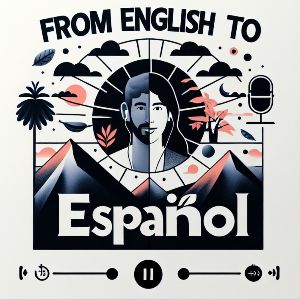How to Use "Sin" Followed by an Infinitive to Say "Without Doing" in Spanish
April 23, 2025Categories: Spanish Grammar Lessons, Lesson


From English to Español: Bridging the Grammar Gap with Alberto Rodriquez
Welcome to "From English to Español: Bridging the Grammar Gap", the podcast created specifically for English speakers ready to take their Spanish skills to the next level. Each episode dives into the core differences and surprising similarities between English and Spanish grammar, unraveling the complexities of the language in a way that’s clear, practical, and easy to follow. We'll break down essential concepts like verb conjugations, gendered nouns, and the tricky subjunctive mood, offering insights and tips that simplify these new rules and help you avoid common pitfalls. By comparing Spanish structures directly with English, you’ll quickly understand how to adapt what you already know into accurate, natural Spanish. Whether you’re a beginner or looking to brush up on advanced topics, this podcast is your comprehensive guide for bridging the gap between English and Spanish grammar, so you can speak and write with confidence. Join us daily for a new rule or concept, complete with practical examples, exercises, and memorable explanations that make learning Spanish engaging and enjoyable. Perfect for self-learners, students, and anyone serious about mastering Spanish grammar, "From English to Español" is your go-to resource for building fluency from the ground up.
The Use of "Sin" Followed by an Infinitive in Spanish
When learning Spanish, understanding how to express "without doing something" is an essential part of conveying negation or absence of action in a sentence. One of the most common ways to express this idea is by using the preposition sin followed by an infinitive verb. This construction directly translates to "without doing something" and is a concise and natural way to communicate this concept in Spanish.
Basic Structure
The grammar rule is straightforward: sin + infinitive verb. The infinitive is the base form of the verb, such as comer (to eat), hablar (to speak), or estudiar (to study).
- Sin comer : without eating
- Sin hablar : without speaking
- Sin estudiar: without studying
Example sentences:
- Él salió de la casa sin decir adiós. — He left the house without saying goodbye.
- No puedes entrar sin mostrar tu identificación. — You can’t enter without showing your identification.
- Ella logró el trabajo sin tener mucha experiencia. — She got the job without having much experience.
Usage Notes
In English, "without" is often followed by a gerund (-ing form), for instance, "without talking" or "without eating." In Spanish, instead of a gerund, the infinitive verb is used after sin. This is a key difference between the two languages and one that learners should remember to avoid incorrect expressions like sin hablando or sin comiendo.
Therefore, always remember:
- Correct: sin + infinitive (sin estudiar)
- Incorrect: sin + gerund (sin estudiando)
Exceptions and Special Cases
Although the general rule is that sin is followed by the infinitive, there are a few cases worth noting:
- Use with nouns or pronouns: Sometimes, “sin” is followed by a noun or pronoun rather than a verb. For example:
- Salió sin su cartera. — He left without his wallet.
- No podemos trabajar sin ella. — We cannot work without her.
- Omission of the infinitive with impersonal commands: In some fixed expressions or instructions, the infinitive may be implied but not stated. For example:
- Sin hablar is often used in instructions, but you might also see:
Prohibido sin permiso. — Prohibited without permission. (Permission is implied; the verb is omitted).
- Regional variation: In some Spanish-speaking regions, colloquial speech might sometimes bend this rule for emphasis or style, but this is not considered grammatically proper in formal or academic Spanish.
Comparative Structures With Other Prepositions
It can be helpful to compare sin + infinitive with how other prepositions interact with infinitives:
- Antes de + infinitive — before doing something
Example: Antes de salir, cierra la ventana. (Before leaving, close the window.) - Después de + infinitive — after doing something
Example: Después de comer, vamos al cine. (After eating, we go to the movies.) - Para + infinitive — in order to do something
Example: Estudio para aprender español. (I study in order to learn Spanish.)
These patterns reinforce the idea that in Spanish, prepositions governing verbs are followed by the infinitive form, not a conjugated verb or gerund.
Summary
To summarize, when expressing "without doing something" in Spanish, the formula is:
sin + infinitive
This structure is commonly used, easy to apply, and grammatically correct in both formal and informal contexts. Remember to avoid using the gerund after sin and note that this rule only applies when sin introduces an action rather than a noun or pronoun.
Practice by creating sentences with sin + infinitive, such as:
- Sin comer, no puedo trabajar.
- Ella salió sin avisar.
- Sin estudiar, no aprobarás el examen.
Use these examples to help internalize the rule and improve your fluency in Spanish.
Learn more about Spanish grammar rules and effective language learning techniques at ScienceBasedLearning.com. Enhance your skills with clear, research-backed lessons. Get Your Copy of helpful resources today by visiting ScienceBasedLearning.com.